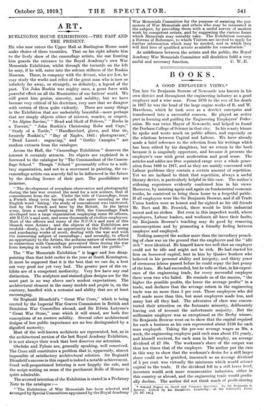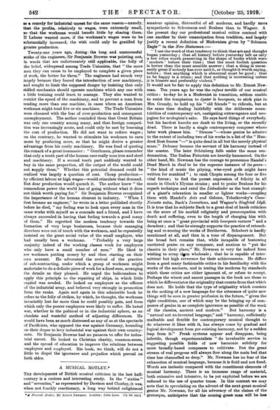BOOKS
A GOOD EMPLOYER'S VIEWS.* THE late Sir Benjamin Browne of Newcastle was known in his own district and throughout the engineering industry as a good employer and a wise man. From 1870 to the eve of his death in 1917 he was the head of the large engine works of R. and W. Hawthorn, which he took over as a derelict enterprise and transformed into a successful concern. He played an active part in forming and guiding the Engineering Employers' Federation. He was twice Mayor of Newcastle, and helped to found the Durham College of Science in that city. In his scanty leisure he spoke and wrote much on public affairs, and especially on the relations between Capital and Labour. We have already made a brief reference to the selection from his writings which has been edited by his daughters, but we return to the book because it is singularly opportune, and because it presents the employer's case with great moderation and good sense. The articles and addresses htre reprinted range over a whole generation from 1886 to 1917, and as they are mainly concerned with Labour problems they contain a certain amount of repetition. Yet we are inclined to think that repetition, always a useful literary device, is particularly helpful in this case. The author's widening experience evidently confirmed him in his views. Moreover, by insisting again and again on fundamental economic truths, he contrived to bring them home to a forgetful public. If all employers were like Sir Benjamin Browne, and if all Trade Union leaders were as honest and far-sighted as his old friends Mr. Burt and Mr. Fenwick, there would be little industrial unrest and no strikes. But even in this imperfect world, where employers, Labour leaders, and workmen all have their faults, Sir Benjamin Browne's teaching may do good by removing misconceptions and by promoting a friendly feeling between employer and employed.
Nothing annoyed the author more than the incendiary preaching of class war on the ground that the employers and the " idle rich " were identical. He himself knew too well that an employer could not be idle and might not be rich. He had started his firm on borrowed capital, lent to him by Quaker bankers who believed in his personal ability and integrity, and thirty years of strenuous labour passed before he could repay the last penny of the loan. He had succeeded, but he tells us that, in his experience of the engineering trade, for every successful employer there were two who failed. He reminds us of the maxim, " the higher the possible profits, the lower the average profits" in a trade, and declares that the average return in the engineering trade was no more than 5 per cent. Those employers who did well made more than this, but most employers made less, and many lost all they had. The advocates of class war concentrated their attention on the fortunate minority, deliberately leaving out of account the unfortunate majority. But the millionaire employer was as exceptional as the Derby winner. Sir Benjamin Browne went on to show that the capital required for such a business as his own represented about £150 for each man employed. Taking the pre-war average wages as 30s. a week, the engineering employer paid each man about £75 yearly, and himself received, for each man in his employ, an average dividend of £7 10s. The workman's share of the output was thus ten times that of the employer. The author put the case in this way to show that the workman's desire for a still larger share could not be gratified, inasmuch as an average dividend of 5 per cent. was virtually the minimum which would attract capital to the trade. If the dividend fell to a still lower level, investors would seek more remunerative industries, either in this country or abroad, and the engineering trade would gradually decline. The author did not think much of profit-sharing as a remedy for industrial unrest for the same reason—namely, that the profits, relatively to wages, were extremely small, so that the workman would benefit little by sharing • them.. If Labour -wanted more, if the workman's wages were • to he substantially increased, the wish could only be gratified by greater. production.
Twenty-one years ago, during ! the long and unsuccessful strike of the engineers, Sit Benjamin Browne was pointing out in words that are unfortunately still applicable, the folly of the belief, widespread -among Trade Unionists, that " the more men they can cause to be employed to complete a given piece of work, the better for them." The engineers had struck very largely because they feared the introduction of new machinery, and sought to -limit the supposed danger by insisting that only skilled-mechanics should operate machines which any one with a little training could learn to manage. , They also wanted to restrict the speed of the machinery, and to prevent a man from tending more than one machine, in oases where an American workman might tend five or six machines. The Trade Unionists were obsessed with the fear of over-production and consequent unemployment,. The author reminded them that Great Britain was only one eountry among many, and that • foreign competition was increasingly acute, and could only be met by lessening the cost of production. He did not want to reduce wages ; on the contrary, he wanted, to stimulate his workmen to earn more by producing more, so that he might derive a greater advantage from his costly machinery. He was fond of quoting the remark of a great ironmaster : " Gentlemen, please• remember that only a tenth part of the human race really uses iron and steel and machinery. If a second tenth part suddenly wanted to buy in the same proportion, all theoutput of the world could not supply them." Whether this potential demand could be realized was largely a question of cost. Cheap production— by efficient labour at high wages—would stimulate that demand. But dear production would quench it. The author knew " the tremendous power the world has-of going, without what it does not think worth paying for." Sir Benjamin Browne recognized the importance of the human element in industry. " When I first became an engineer," hewrote in a letter published shortly before he. died, " my feeling wale to look upon every man in the same works with myself as comrade and a friend, and I have always succeeded in having that feeling towards a good many of them." He regretted the modern tendency towards the formation of very large businesses, because their managing directors were out of touch with the workmen, •and he repeatedly insisted on the great• social value of the small employer, who had• usually been a workman. " Probably a very large majority indeed of the • working classes work for employers who only have a small number of men." Her liked to see workmen putting money by and 'then starting .on their own aceoimt He advocated the revival of the • practice of sub-contracting, under which -a group of workmen might undertaketo do a definite piece of work for a fixed sum, arranging the details' as they pleased. • He urged the boilermakers to apply this principle to the repairing of ships, in which. little capital was needed. He looked on employers as the officers of the industrial army, and believed very strongly in promotion from the ranks. Again and again in this admirable book he refers to the folly of strikes, by which, he thought, the workmaninvariably lost far more than he could possibly gain, and from which only the poorer employers were likely to suffer. He hated war, whether in the political -or in the industrial sphere, as an obsolete and wasteful method of adjusting differences. He would have been as much distressed as any of us at the spectacle of Pa,cificists, who opposed the war• against Germany, hounding on their dupes to levy industrial war against their own countrymen. Sir Benjamin Browne had no panacea to offer for industrial unrest. He looked to Christian charity, common-sense, and the spread of education to improve -the relations between employers and employed. His book, we think, will do not a little -to dispel the ignorance and prejudice which prevail on both sides.











































 Previous page
Previous page